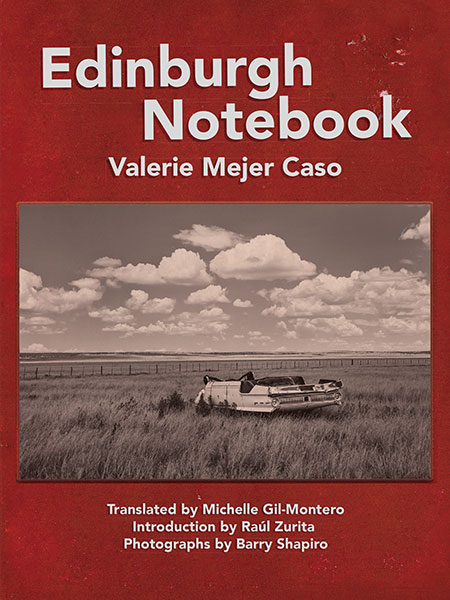
Edinburgh Notebook
Valerie Mejer Caso
Translated by Michelle Gil-Montero
ISBN 978-0-900575-08-2 | 158 pages | $20 | March 1, 2021
I love you: you feed me from an impossible host.
I love you: I hear your wings tearing apart
in frenzied flight through the deep trench of my chest.
Hurry, hurry, holy bird!
A book-length epitaph for her late brother Charlie, Valerie Mejer Caso’s Edinburgh Notebook is a captivating, startling expression of grief. Following a trail of breadcrumbs, Mejer Caso’s poems shift between memories, cities, philosophies, echoes and landscapes of quicksand, oceans, deserts, apocalypse. Featuring photographs by Barry Shapiro, Edinburgh Notebook contains a profound archive of cultural history coursing with elliptical, illuminating poems. “Even without being / you are what exists and what does not exist, / the looming night.”
REVIEWS OF EDINBURGH NOTEBOOK
[Mejer Caso’s] work draws inspiration from the painterly imagery of the Surrealists and the absurdity of the existentialists; at times it’s reminiscent of the rapture of Rilke’s “Duino Elegies,” at others of the linguistic oddity of César Vallejo’s “Trilce.”
For Valerie Mejer Caso, Edinburgh Notebook is a testament to the power of language’s ability to heal and to help come close to answering the questions we thought grief would silence us from asking. Written in the wake of her brother Charlie’s suicide, Mejer Caso’s collection, through honest language and hallucinatory imagery, examines the consequences of uncertainty and sorrow when those we love the most are gone.
Michelle Gil-Montero’s translation of Edinburgh Notebook is tuned in to the echoey, open sounds of Mejer Caso’s poetry as in “rolling like worlds” and “The crone Moon was coming back.” But more than just tracking sonic echoes, Gil-Montero manages the many unruly, thematic trails of Mejer Caso’s poetry throughout her translation, reminding the reader through purposeful reiterations and resonant images of the same event, at once a flight and a fall, a vacuum, a silence, an explosion.
PRAISE FOR EDINBURGH NOTEBOOK
The language that emerges is one pierced by the world and by our actions in the world. Constructed from the limit of experience, these poems have relinquished all rhetorical temptation, any purely verbal exploration, in order to insist on an infinitely more risky investigation: that of capturing the instant just before things turn to shadows.
—Raúl Zurita, author of The Country of Planks
At its best a book of poetry can capture the solitary intellectual vexations we have with memory and death, which live at the center of all our reckoning. Edinburgh Notebook is such a book. Valerie Mejer Caso, deftly translated by Michelle Gil-Montero, is an exquisite archivist of the evidence we rely on to revisit our histories: stained photographs, bats, and fleeting glimpses, the palimpsests that flitter from gorgeous nocturnes: “I’ll wreck the piano, and the dust of its bones will sound mournful, and that possible song will replay like a canon.” I love the haunted library of this book and the cool blue eye that dizzies then rights me with both heart and head.
—Carmen Giménez Smith, author of Be Recorder
PRAISE FOR THIS BLUE NOVEL
Mejer Caso demonstrates an extraordinary ability to balance obfuscation and clarity to render a mesmerizing, dynamic, layered collection that is both vertiginous and knowable.
—Publishers Weekly
Like Eleni Sikelianos’ You Animal Machine and Michael Ondaatje’s The Collected Works of Billy the Kid, it participates in a tradition of documentary poetics, bringing together image and text to gradually assemble a portrait of a person (or people). As the poems unfold, images and descriptions reveal Mejer Caso’s Spanish, German, and English heritage. This is poetry concerned with memory and the holding of memory.
—Kelsi Vanada, translator of Sergio Espinosa’s Into Muteness
A painter and poet and translator, Mejer Caso brings us through several forms of artistic limbo. The poetry of her novel forces the boundaries (because we don’t need those anyway) of the genre to bend for her; the interplay of the living and the dead forces us to consider the closeness of the two.
—Alex Niemi, translator of Vincent Tholome’s The John Cage Experiences
ABOUT THE AUTHOR
Painter and poet Valerie Mejer Caso was born in Mexico City into a family of European immigrants. She is the author of the poetry collections Rain of the Future (2013), translated by C.D. Wright, Forrest Gander, and Alexandra Zelman; de la ola, el atajo (2009); Geografías de Niebla (2008); Esta Novela Azul (2004), which was translated by Michelle Gil-Montero as This Blue Novel (2015); and Ante el Ojo de Cíclope (1999). Her book De Elefante a Elefante (1997) won the Spanish Government’s “Gerardo Diego 1966” International Award. Mejer Caso has collaborated with photographers, among them Barry Shapiro and Russel Monk. With the photographer D.S Borris, Mejer Caso and Forrest Gander co-authored Time’s Playing Fields, a book about empty football fields in Mexico (Blue Star Contemporary Art Center, TX). She has translated poetry by Charles Wright, Ruth Fainligth, and Pascale Petit. From 2016-17, she participated in the Bienalle of Kochi-Muziris in India, where she exhibited her unfolded book “Untamable Light.” Her poetry has been translated into English, Slovenian, and Korean.
ABOUT THE TRANSLATOR
Michelle Gil-Montero is a poet and translator of Latin American poetry, hybrid-genre writing, and criticism. She has been awarded fellowships from the NEA and Howard Foundation, as well as a Fulbright US Scholar’s Grant to Argentina and a PEN/Heim Translation Prize. She is the author of Attached Houses (Brooklyn Arts Press) and Object Permanence (Ornithopter Press). She is Professor of English at Saint Vincent College, where she directs the Minor in Literary Translation. She publishes contemporary Latin American poetry in translation at Eulalia Books (eulaliabooks.com).